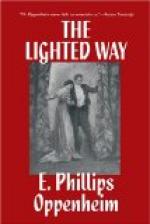Apparently, after a time, they gave up all hope of the still motionless man. They talked together, glancing now and then towards his body. The window was open at the top and Arnold could sometimes hear a word. With great difficulty, he gathered that they were proposing to remove him, and that they were taking the back way. Presently he saw them lift the body down and wrap it in an overcoat. Then Arnold stole away across the lawn toward a gate in the wall. It was locked, but it was easy for him to climb over. He had barely done so when he saw the three men come out of the back of the house, carrying their wounded comrade. He waited till he was sure they were coming, and then looked around for a hiding-place. He was now in a sort of lane, ending in a cul de sac at the back of Mr. Weatherley’s house. There were gardens on one side, parallel with the one through which he had just passed, and opposite were stables, motor sheds and tool houses. He slipped a little way down the lane and concealed himself behind a load of wood. About forty yards away was a street, for which he imagined that they would probably make. He held his breath and waited.
In a few minutes he saw the door in the wall open. One of the men slipped out and looked up and down. He apparently signaled that the coast was clear, and soon the others followed him. They came down the lane, walking very slowly—a weird and uncanny little procession. Arnold caught a glimpse of them as they passed. The two larger men were supporting their fallen companion between them, each with an arm under his armpits, so that the fact that he was really being carried was barely noticeable. Isaac came behind, his hands thrust deep into his overcoat pocket, a cloth cap drawn over his features. So they went on to the end of the lane. As soon as they had reached it, Arnold followed them swiftly. When he gained the street, they were about twenty yards to the right, looking around them. It was a fairly populous neighborhood, with a row of villas on the other side of the road, and a few shops lower down. They stood there, having carefully chosen a place remote from the gas lamps, until at last a taxicab came crawling by. They hailed it, and Isaac engaged the driver’s attention apparently with some complicated direction, while the others lifted their burden into the taxicab. One man got in with him. Isaac and the other, with ordinary good-nights, strode away. The taxicab turned around and headed westward. Arnold, with a long breath, watched them all disappear. Then he, too, turned homewards.
It was almost midnight when Arnold was shown once more into the presence of Sabatini. Sabatini, in a black velvet smoking jacket, was lying upon a sofa in his library, with a recently published edition de luxe of Alfred de Musset’s poems upon his knee. He looked up with some surprise at Arnold’s entrance.
“Why, it is my strenuous young friend again!” he declared. “Have you brought me a message from Fenella?”




